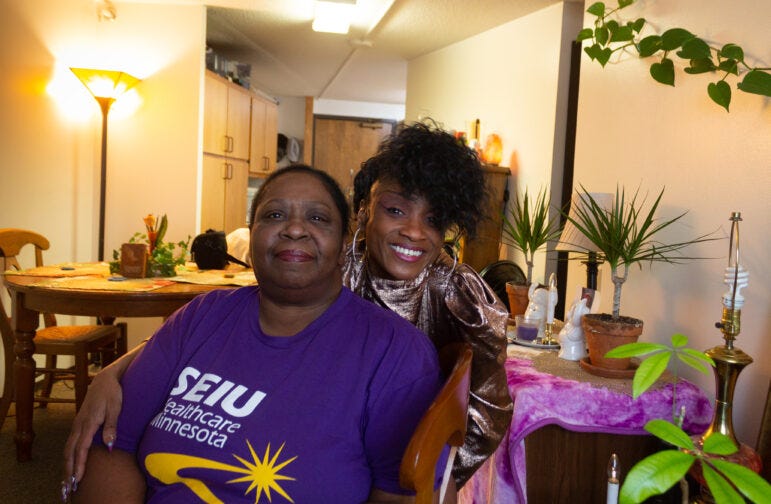“Who’s gonna care for us when we need the care?”
Disabled Minnesotans and home care workers are struggling to receive and provide dignified care. Plus, two stories on government funding related to working people in the U.S. and Afghanistan.
Happy holidays, friends! We’re sending you warm and cozy thoughts as a winter storm descends upon us in the Midwest. If you have a few extra minutes in your day, we’d appreciate it if you could fill out this survey.
💪 Dignified work and care
Isabela spoke with caregivers and disabled Minnesotans for a story on the home care crisis, showing how the fight to improve working conditions for home care workers is also the fight to improve living conditions for disabled people and their families. Shout out to The Real News for republishing this piece!
Disabled Minnesotans Are Facing a Home Care Crisis. Workers Are Calling on Democrats to Change That.

“During the pandemic, Johnson continued working, while many made the choice to leave the field for their own safety, which she described as straining an already tight workforce. She describes an overstretched workforce. “There’s not enough of us to provide services. During the pandemic, I found myself running from patient to patient, providing partial services, spreading myself among people so that they can get some type of service.”
“It’s taxing on your mind, body, and soul,” she says. “I’m lifting, I’m bending. It’s not just that I’m sweeping a kitchen or washing some dishes. I might have to transfer someone from their chair to their bed. My body is breaking down.”
💰 U.S. military budget increase is 3,200 times the NLRB’s increase
Labor educator Amy Livingston collaborated with Sarah on this in-depth story co-published with In These Times comparing the military budget to the NLRB budget:
“Mainstream attitudes in Washington would likely posit that it is ridiculous to compare NLRB spending with “defense” spending, as the latter performs a vital, nonnegotiable service whose massive funding is a given and workers’ rights, on the other hand, are considered dispensable. Regardless, the comparison provides useful insights into the moral priorities of our political system.”
💰 Why is the U.S. freezing funds that would help Afghans?
The U.S. sanctioning of Afghanistan, and freezing of the country's central bank assets, is a labor issue, because it affects Afghan workers and is a driver of mass poverty and starvation. In partnership with In These Times, we published Sarah’s story: As Afghans Suffer, U.S. Stalls on Plan to Return Central Bank Funds:
“According to Cavan Kharrazian, a progressive foreign policy advocate for Demand Progress, any delay will most greatly harm those who are already vulnerable and oppressed under Taliban rule. “For the foreseeable future, the Taliban will be in charge of the government of Afghanistan,” Kharrazian says. “While they have a deplorable human rights record, especially towards women, there is also a severe economic and humanitarian crisis in the country that needs immediate attention. This crisis affects the most vulnerable segments of society the worst.”
🤔 How the “labor shortage” harms workers
If you’re with family over the holidays and you hear a family member using the “labor shortage” as an excuse for whatever a boss or company is doing, send them this article Sarah wrote, The "Labor Shortage" is Being Used as a Pretext to Harm Workers:
“The concept of a labor shortage can be used to effectively justify any anti-worker policy under the sun. From reading the financial press or listening to business elites, the shortage may seem like an economic fact — a material reality that is beyond dispute. But, in reality, the framing of a “labor shortage” is at its heart ideological. As long as we’re talking about a labor shortage, we’re not talking about a shortage of good, dignified union jobs. As long as we’re talking about how people “don’t want to work,” we’re not talking about how bosses don’t want to treat their employees with basic fairness and respect. And as long as we’re talking about how it’s bosses who are supposedly hurting, we’re not talking about what it would take to build an economy that doesn’t perpetually harm the poor and dispossessed.”
👀 Will the next Amazon labor union be in Minnesota?
The workers at the Amazon warehouse in Shakopee are pursuing their next collective action: forming a union. Max Nesterak reports for the Minnesota Reformer on their launch of a union drive.
🚂 The Little Engine that couldn’t have paid sick leave
Check out this piece at the Center for Economic Policy and Research on the lack of universal paid sick leave and how the railroad workers’ fight for better working conditions is a prime example of how the U.S. treats working people:
“Lack of paid leave encourages people to come to work sick, increasing transmission of communicable diseases, such as COVID-19. During the first nine months of the pandemic in California, transportation and logistics workers had higher per-capita excess mortality than workers in any other “essential” industry group.
By withholding paid sick leave and requiring unpredictable schedules, railroad companies have contributed to long-term problems with worker shortages and supply chain resilience. Railroad workers have been on the frontlines of the COVID-19 pandemic from the beginning. Their hard work has ensured that vital shipments of food, medicine, and other goods continued despite catastrophic logistical breakdowns.”
💭 Essential workers panel
Last month, I got to participate in a panel discussion hosted by East Side Freedom Library with other essential workers. We reflected on our pandemic experiences and Carolyn Olson’s portraits. Check out the video below!
💡 Ironworkers make holiday magic
Bentleyville is a light show in Duluth that happens every year because of help from the building trades. Watch the video celebrating their work!




